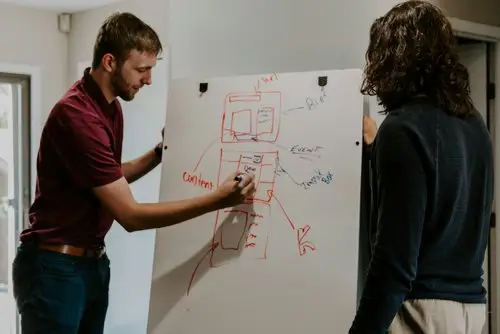Why Change Managers Are a Program Manager’s Secret Weapon

While capability isn’t usually the question, capacity certainly is. When you add more responsibilities, something has to give, right?
You can’t risk the program’s integrity by not investing time in the people aspect.
This is precisely why program and change managers work in partnership to ensure that nothing is missed, benefits are realised, and milestones are met. Success is truly a team effort.
Let’s dive into why change professionals are indispensable for program managers.

The Perfect Partnership: Dividing and Conquering
Program managers are often buried in reporting, juggling resources and tracking milestones. They’re focused on delivering projects on time, within budget, and meeting technical requirements.
But what about the human element? That’s where change managers step in, creating a perfect complementary relationship.
Change managers focus on the people side of change, ensuring the adoption and realisation of benefits. It’s a team effort that addresses the technical and human aspects of project success.
Projects with excellent change management were six times more likely to meet objectives than those with poor or no change management.
— A study by Prosci
Putting People First: The Change Management Process
Change managers bring a crucial human touch to program management.
They understand that there are people who need to adapt behind every milestone and deliverable. Here’s their playbook:
- Stakeholder Analysis: They identify key stakeholders and understand their concerns.
- Change Impact Assessment: They evaluate how the change will affect different parts of the organisation.
- Change Strategy Development: They create a comprehensive change management process with robust support systems to help people through transitions.
- Training and Development: They design and implement training programs to get everyone up to speed.
- Communication Planning: They maintain open and transparent lines of communication and build trust throughout the change process.
By handling these people-focused tasks, change managers free up program managers to excel at what they do best:
- Managing and optimising budgets
- Allocating and planning resources effectively
- Tracking and adjusting milestones
- Monitoring overall program progress and reporting to stakeholders

Shared Responsibilities, Distinct Focuses
While program managers and change managers have unique roles, they share essential vital responsibilities:
- Planning: Both roles require careful planning, though with different emphases. Program managers plan project timelines and resource allocation, while change managers plan engagement, communication strategies, and training programs.
- Stakeholder Engagement: Program managers engage stakeholders for project requirements and updates, while change managers focus on stakeholder buy-in, understanding risks, and ensuring readiness for the change.
- Problem-solving: Both roles encounter obstacles. Program managers might tackle technical or logistical issues, while change managers address resistance to change or adoption challenges.
- Continuous Improvement: Both roles involve learning from each project or change initiative to refine processes for future success
Executive Coaching: Championing Change from the Top
Change managers often work closely with organisational leaders through executive coaching.
This process helps executives understand their role in championing change, communicate effectively with their teams, and lead by example during transitions.
By aligning leadership with the change vision, change managers create a powerful force for organisational transformation.
When It All Comes Together: Real-World Examples
Picture a significant tech rollout. The program manager focuses on system specifications, vendor management, and go-live dates. Meanwhile, the change manager prepares the team, runs training sessions, and builds enthusiasm for the new system. Together, they’re installing new technology and transforming how people work.
In a large-scale restructure, the program manager might handle the logistics of department shifts and resource reallocation. The change manager would focus on helping employees understand and adapt to their new roles, managing potential resistance, and ensuring the new structure is embraced across the organisation.
Overcoming Challenges in the Partnership
Like any partnership, program and change managers may face challenges. These could include differing priorities, communication gaps, or overlapping responsibilities. The key to overcoming these hurdles is a clear role definition, regular check-ins, and a shared commitment to the project’s success.

Better Together: The Power of Collaboration
In today’s complex business environment, the partnership between change and program managers is not just a necessity but a strategic advantage. This collaboration ensures that programs meet their technical objectives and achieve lasting, positive organisational change, which is often challenging when approached in isolation.
The early conduct of a change impact assessment is a critical factor in project success. It helps identify potential barriers to change and informs the strategies needed for success. Combined with the program manager’s technical evaluation, this assessment provides a comprehensive view of the project’s landscape, enabling a more robust and effective implementation plan.
Program managers, if you haven’t had the pleasure of working with fantastic change management consultants, we assure you they’re essential partners in your program’s success. While you’re crunching numbers and tracking timelines, they’re ensuring your team is ready, willing, and able to make your vision a reality.
This powerful combination of skills and focuses doesn’t just tick boxes—it drives real, lasting change. In the end, that’s what successful program management is all about
Prepare for Your Next Transformation
As you plan your next transformation initiative, remember the vital role that change managers play in ensuring success. Here are some steps you can take:
- Assess your project’s complexity and potential impact on your organisation.
- Consider the change management resources you’ll need alongside your technical team.
- Include change management in your initial project planning and budgeting.
- Reach out to change management professionals early in your process for guidance.
Don’t leave the people’s side of change to chance. Invest in change management to maximise your program’s success and drive lasting organisational transformation.
Ready to take the next step? Contact us to discuss how to understand the complexity of your change and get support in building your business case for the proper resourcing. Together, we can ensure your next transformation project meets its goals and exceeds expectations in driving positive organisational change.
Read more on managing change on any budget by investing in the right support you can ensure you are set up for success.

